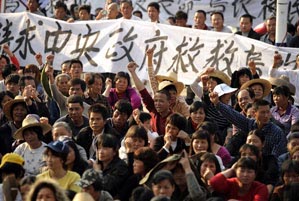
First (2011) and Second (2012) International Conference on Land Grabs, organized by the Land Deal Politics Initiative (LDPI) and the Cornell Dept. of Development Sociology.
Land from the Tiller: China's role in global processes of land dispossession.
Current land grabbing debates highlight wealthy nations' roles through aid regimes, FDI, and sovereign wealth funds. China is an important node in these global processes. Yet the Chinese state's land appropriations are complex, outside typical conceptualizations and not formally integrated into many analyses. This land grabbing is both domestic and international, state-run and in partnership with domestic and international capital, direct and indirect in form, and built upon assumptions drawn from and reinforcing neoliberal discourse on development and modernization.

The Chinese state has three distinct interconnected roles in large-scale land acquisitions. First, China's evolving aid regime and associated state and quasi-state companies are international investors in land-intensive businesses-palm plantations, timber concessions, mining, infrastructure projects, and agribusiness. Second, the Chinese state plays host to international business interests, partnering with domestic and state companies to expand large-scale commodity production. Third, the Chinese state is an enabler of land dispossession through contested domestic policies including a) land decollectivization, most recently of collective forests; b) enclosures and privatization of commons; c) land privatization via 'land reform'; d) infrastructure, real estate, extractive and industrial expansion; and e) environmental policies such as sloping land conversion, logging and grazing bans. This paper attempts to clarify these varied landscapes of dispossession, and the array of institutions supportive of the direct and indirect, formal and informal processes. It argues that China shares the assumptions of dominant international aid organizations, despite protests to the contrary, concerning benefits of modernization via hegemonic prescriptions of commodity production for global markets.
